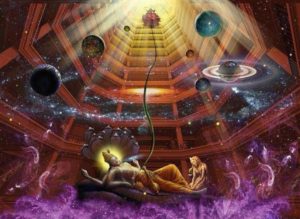 A horoscope in your hands is a map of destiny. The secrets that it contains can be revealed only by a Vedic Astrologer.
A horoscope in your hands is a map of destiny. The secrets that it contains can be revealed only by a Vedic Astrologer.
Now you may be wondering,
What is Vedic Astrology?
You probably have heard of astrology – who hasn’t? but very few know about Vedic Astrology, the subject of this report. The Vedas are the oldest scriptures known to exist, being well over 5,000 years old. The vast ocean of Vedic knowledge encompasses both material and spiritual knowledge; it is perfect knowledge that was revealed by Sri Krsna (The Godhead) to the Rishis, the sages of Vedic culture. Astrology is part of the Vedic literature, and has been preserved and handed down in the guru-parampara, the chain of apostolic succession, since time immemorial. Vedic Astrology is the original form of astrology that existed thousands of years ago in what is now known as the Indian subcontinent. It gradually spread by diffusion into other cultures such as the Babylonian, Persian, Greek, Chinese, etc. Vedic astrology, being an appendix to the Vedas, is thoroughly steeped in Vedic thought and philosophy. This means that the serious practitioner of the science must have earnestly assimilated the Vedic philosophy and lived the life of a Vedic Brahmana, with all its attendant spiritual practices.
Combined effect of genuine philosophical knowledge coupled with an authentic spiritual lifestyle cannot be overestimated when it comes to developing the divine vision and ability that is so necessary for enabling an astrologer to properly guide others.
The birth-map, or horoscope, is a symbolic representation of the Earth, planets, and stars at the time of one’ s birth. It is a divine language, a mystic cryptogram by which God has communicated what a person’s destiny will be, knowing which a wise person will exercise his free will to optimize the result.
Fate Free Will and Vedic Astrology
The viewpoint of Vedic Astrology is that life is an interplay of both fate and free will – fate being the reaction to our previous exercise of free will. In our lives we are often faced with choices presented to us by our environmental circumstances. We have the freedom to chose “a” or “b,” but once that decision is made we must accept the reaction to our choice. The reaction may be immediate, or it may be delayed by thousands of lifetimes. In any case, the reaction, pleasant or unpleasant, will come at the appointed time determined by higher authorities.
As Canakya Pandita says,
Just as a calf can find its mother in a herd of 10,000 cows, in the same way your [re]actions will find you.
The reactions to life’s actions are inescapable by everyone except those who are completely devoted to God (via Bhakti-yoga). When a karmic reaction ripens and fructifies it creates a new situation, a new environment that presents us with more choices upon which to exercise our free will.
Thus, life is an interplay of both fate and free will as previously stated.
Let’s consider an example of how this works. Suppose someone is born into a poor family because of his bad karma from a previous lifetime and so is raised in a ghetto beset with crime and poverty. Let us say, hypothetically, that he has two choices. He can blame society for the evils he faces and thus try to victimize society by taking to a life of crime to acquire wealth; or he can take responsibility for his situation and try to better himself by education and honest endeavor. Suppose he chooses the first option of crime and robs several establishments. Eventually he will get caught (if not killed first) and sent to jail, a natural reaction for his criminal behavior. But even while in jail he still has options, though more limited than those of a free man. He can choose to be a hardened criminal or to be a model prisoner and reform himself. Each choice will have a reaction. Thus we can see that life is an intricate interplay of fate (karma) and free will.
Shyamasundara dasa

